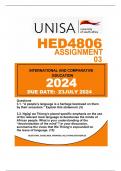, HED4806 ASSIGNMENT 03 DUE DATE: 23JULY 2024
3.1. “A people’s language is a heritage bestowed on them by their ancestors.” Explain
this statement. (5)
This statement means that a person's language is a significant part of their cultural heritage that is
passed down from generation to generation by their ancestors. It emphasizes the importance of
preserving one's language as it is a connection to one's roots, history, and identity. By using their mother
tongue, individuals can maintain a sense of pride, dignity, and self-respect. Embracing and utilizing one's
language is a way of honoring and continuing the tradition and legacy of their ancestors.
Language is a fundamental aspect of culture that serves as a bridge to the past, linking individuals to
their heritage and ancestors. It carries with it the stories, traditions, and values of a community, shaping
their identity and sense of belonging. By preserving and speaking their mother tongue, individuals
maintain a connection to their roots and honor the legacy of those who came before them.
The preservation of one's language is not just about communication, but also about preserving a unique
way of thinking, expressing emotions, and understanding the world. It is a way of safeguarding cultural
knowledge and passing it on to future generations. Language is more than just words; it is a symbol of
resilience, resistance, and pride in the face of adversity.
When individuals embrace their mother tongue, they affirm their cultural heritage and assert their right
to exist as a distinct community with a rich history and tradition. It is a powerful act of self-
determination and empowerment, asserting their presence in a world that often seeks to marginalize
and erase their identities. By valuing and utilizing their language, individuals reaffirm their place in
society and assert their right to be seen, heard, and respected.
Reference:
Seroto, Davids & Wolhuter (2020)
3.2. Ngũgĩ wa Thiong’o placed specific emphasis on the use of the relevant local
language to decolonise the minds of African people. What is your understanding of the
“decolonisation of the mind”? In your discussion, summarise the views that Wa Thiong’o expounded
on the issue of language. (15)
The decolonization of the mind, according to Ngũgĩ wa Thiong’o, is the process of freeing individuals
from the mental framework and ideologies imposed by colonialism. It involves challenging and
dismantling the dominant narratives and systems of thought that were imposed by colonial powers, and
reclaiming indigenous cultures, languages, and ways of knowing. Wa Thiong'o argues that
decolonisation of the mind is crucial for African people to regain their sense of identity, agency, and
autonomy.




